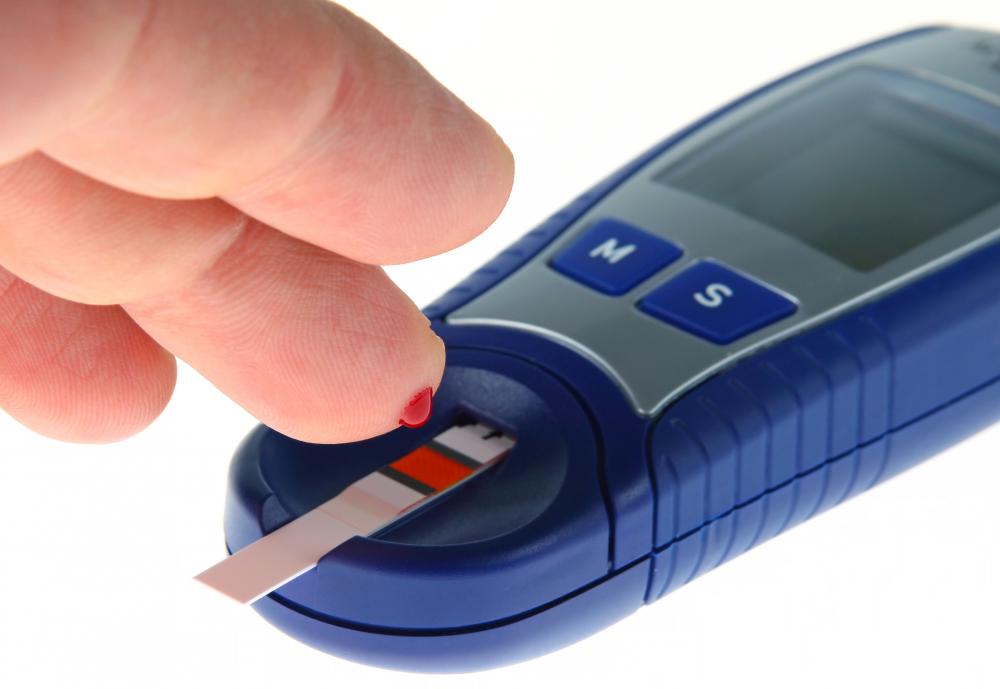At WiseGEEK, we're committed to delivering accurate, trustworthy information. Our expert-authored content is rigorously fact-checked and sourced from credible authorities. Discover how we uphold the highest standards in providing you with reliable knowledge.
What is a Hypoglycemic Attack?
A hypoglycemic attack strikes when the body's blood sugar levels drop to below normal. Hunger, confusion, and sweating are some of the symptoms of a hypoglycemic attack. The condition is commonly linked to diabetes, but those who do not have diabetes may suffer hypoglycemia from medications or other health conditions. Treatment for hypoglycemia involves adjustments to diet and medications to prevent recurring episodes.
During normal production and storage processes, glucose, or blood sugar, comes from foods that are high in carbohydrates. Some examples include bread, milk, rice, and fruit. After a person eats a meal, glucose enters the bloodstream. It then travels to the cells, getting assistance by insulin, which is a hormone produced by the pancreas. Insulin helps the cells absorb the glucose so the body uses energy; any extra glucose travels to the liver, muscles, and fat cells to be stored as extra energy between meals.

Hypoglycemia sets in when glucose and insulin do not get properly absorbed. Too much insulin entering the bloodstream may result in a drastic drop of blood sugar levels. If the body absorbs glucose too quickly and the body lacks any extra blood sugar, hypoglycemia may result. Slow release of glucose into the bloodstream has also been known to cause hypoglycemia.

A hypoglycemic episode occurs suddenly, and symptoms can appear during the day or night. Common symptoms include hunger, nervousness, shakiness, and sweating. Others include confusion, sleepiness, dizziness, and anxiety. Headache, irritability, and heart palpitations also indicate signs of a hypoglycemic attack.
Side effects of diabetes medications remain among the causes of a hypoglycemic attack. For instance, taking too many doses of a diabetes pill or injecting too much insulin can result in a sudden drop in blood sugar levels. Diabetes pills or insulin may counteract with other medications that treat other conditions and thus causing hypoglycemia. For diabetics, other causes of hypoglycemic episodes can come from changes in physical activity and at meal times. For example, a person might increase her daily exercise routine without balancing it with eating enough food, thereby causing low blood sugar.

Hypoglycemia can also occur suddenly in people who don't have diabetes. In this case, two types of hypoglycemia attacks exist: reactive hypoglycemia and fasting hypoglycemia. Both types share the same symptoms as diabetes-related hypoglycemia, including weakness, hunger, sweating, trembling, and anxiety. Enzyme and endocrine deficiencies reportedly cause reactive hypoglycemic attacks. Causes of fasting hypoglycemia include certain medications, tumors, excessive alcohol consumption, and heart, kidney, and liver illnesses.

To treat a hypoglycemic episode, diabetics should monitor their blood sugar level. A reading of 70 mg/dL or below means that levels are too low. Doctors recommend consuming 1/2 cup (approximately 118 ml) of regular soda, 1/2 cup (118 ml) of fruit juice, four glucose tablets, or up to six pieces of hard candy to bring blood glucose levels up to normal.

Those who experience a reactive or fasting hypoglycemic episode can seek treatment by eating snacks or small meals every few hours. Medical experts also recommend sticking to a balanced diet of vegetables, fruits, whole grains, meats, poultry, fish, and dairy to prevent future attacks. Incorporating regular daily exercise also helps to prevent a hypoglycemic attack.
AS FEATURED ON:
AS FEATURED ON:

















Discussion Comments
after reading this article I think this is what my mum is experiencing she wakes most nights with hot sweats and she is wet through and has to get up and change she is a type 2 diabetic and suffers the other symptoms as well such as the palpitations, trembling and anxiety it is really upsetting for her and I want to know if there is anything else that could help her? can anyone help?
Post your comments